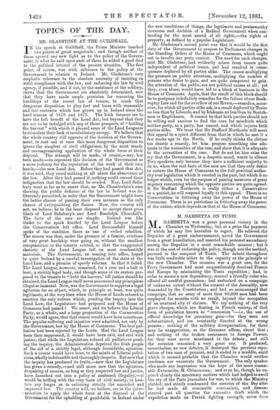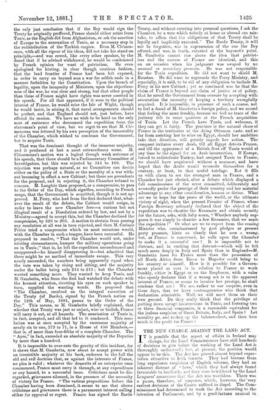M. GAMBETTA ON TUNIS.
GAMBETTA won a great personal victory in the
• Chamber on Wednesday, but at a price the payment of which he may live hereafter to regret. He relieved the Deputies of a great embarrassment, saved the Government from a great humiliation, and asserted his personal ascendancy among the Deputies in a most remarkable manner ; but it was at the cost of endorsing the policy, though not the method,1 pursued in the conquest of Tunis. The debate throughout was little creditable either to the capacity or the principle of the new Chamber. The occasion was a great one, for the Ferry Government had most unquestionably deceived France and Europe by minimising the Tunis expedition ; had, in order to secure a new dependency, coerced a friendly ruler who. offered all needful guarantees ; had embarked on a campaign of unknown extent without the consent of the Assembly, now demanded by the Constitution ; and had so mismanaged that campaign, that an army of more than 90,000 men had been employed for months with no result, beyond the occupatioi. of an unarmed city of shrines. We say nothing of the very grave charges, which are floating in French society, of that form of peculation known as "concussion "—i.e., the use of official knowledge for pecuniary gain—for they were no substantiated, and are constantly directed at the wrong persons ; nothing of the military disorganisation, for there may be exaggeration, as the Germans affirm, about that ; and nothing of the broken assurances to foreign Powers, for they were never mentioned in the debate ; and still the occasion remained a very great one. It produced, nevertheless, no new debater, it destroyed the previous repu- tation of two men of promise, and it ended in a muddle, amid which it seemed probable that the Chamber would neither condemn nor exonerate the Government. The only speaker who made any impression was the hope of the more reason- able Extremists M. Clemenceau ; and even he, though he ex- posed clearly the mercenary motives which had helped to swell the cry of the Paris journalists for war, to which the Ministry yielded, and utterly condemned the coercion of the Bey after he had made all reasonable concessions, and demon- strated past all question the excessive draft which the expedition made on French fighting strength, never drew
the only just conclusion that if the Bey would sign the Treaty he originally proffered, France should either retire from Tunis, as the English did from Afghanistan, or ask the sanction of Europe to the annexation of Tunis, as a necessary step in the redistribution of the Turkish empire. Even M. Clemen- ceau, with all the rigour of his ideas, did not take his stand on principle,—and was cowed, like every other speaker, by the dread that if he advised withdrawal, he would be condemned by French opinion for want of patriotism. He even apologised for hinting, in clear though cautious fashion, that the land frontier of France had been left exposed, in order to carry on beyond seas a war for selfish ends in a manner forbidden by the Constitution. Upon the breach of legality, upon the incapacity of Ministers, upon the objectless- ness of the war, he was clear and strong, but that other people than those of France might have rights was never asserted in his speech. For all that appeared, if it were to the political interest of France, he would seize the Isle of Wight, though he would insist, in seizing it, that naval arrangements should be perfect, and that England should not, just before, have offered its cession. We have no wish to be hard on the only man of eminence who denounced the expedition from the statesman's point of view, but we reget to see that M. Cle- menceau was fettered by his own perception of the immorality of the Chamber, which wished to condemn the Government, but to acquire Tunis.
That was the dominant thought of the immense majority, and it produced at last a most extraordinary scene. M. Clemencean's motion was a logical though weak outcome of his speech, that there should be a Parliamentary Committee of Investigation, but this was rejected by 344 to 168. The rejection was perhaps natural, as no Committee can decide either on the policy of a State or the morality of a war with- out becoming in effect a new Cabinet; but there are precedents for the proposal, and in rejecting it, the Chamber refused to censure. M. Langlois then proposed, as a compromise, to pass to the Order of the Day, which signifies, according to French usage, that the Government is acquitted, though it is not ap- proved. M. Ferry, who had from the first declared that, what- ever the result of the debate, the Cabinet would resign, in order to leave the new Chamber free—a curious but not illogical result of a Dissolution ordered by law, and not by a Ministry—agreed to accept this, but the Chamber declined the compromise, by 326 to 205. A motion to abstain from passing any resolution at all was in turn rejected, and then M. Casimir Perier tried a compromise which on most occasions would, with the Chamber in such a temper, have been successful. He proposed to resolve, "That the Chamber would not, under existing circumstances, hamper the military operations going on in Tunis ;" that is, he left the expedition uncondemned and unapproved—he himself disapproving it—but admitted that there might be no method of immediate escape. This very nearly succeeded, the numbers being apparently equal when the vote was taken by rising and sitting, and the majority under the ballot being only 244 to 213; but the Chamber wanted something more. They wanted to keep Tunis, and M. Gambetta, who from the first had watched the debate with the keenest attention, rivetting his eyes on each speaker in turn, supplied the wanting words. He proposed that "The Chamber, resolved on the integral execution of the Treaty (of Bardo), signed by the French nation on the 12th of May, 1881, passes to the Order of the Day." This means, as M. Gambetta briefly explained, that whether that Treaty was just or unjust, wise or foolish, France will carry it out, at all hazards. The annexation of Tunis is, in fact, accepted, and all that led to it condoned. This reso- lution was at once accepted by the enormous majority of nearly six to one, 379 to 71, in a House of 450 Members,— that is, of more than four-fifths of a complete Chamber. The "Ayes," in fact, exceeded an absolute majority of the Deputies by more than a hundred.
It is impossible to over-rate the gravity of this incident, for it shews that M. Gambetta, now about to accept power with an irresistible majority at his back, endorses to the full the old and evil doctrine that, as against the interests of France, no plea is valid ; whatever the demerits of an enterprise once commenced, France must carry it through, at any expenditure or any hazard, to a successful issue. Criticisms must be dis- regarded, grievances silenced, in the presence of the necessity of victory for France. "The various propositions before the Chamber having been dismissed, it seems to me that above criticisms and grievances there is a paramount interest calling either for approval or regret. France has signed the Bardo Treaty, and without entering into personal questions, I ask the Chamber, by a vote which nobody at home or abroad can mis- take, to affirm that the obligations of that Treaty shall be loyally and implicitly executed." The Bardo Treaty, it will not be forgotten, was in supersession of the one the Bey offered, and was, in truth, extorted at the bayonet's point. M. Gambetta cannot rise above the idea that patriot- ism and the success of France are identical, and this on an occasion when his judgment was swayed by no unusual or secondary pressure. He was not responsible for the Tunis expedition. He did not want to shield M. Roustan. He did want to supersede the Ferry Ministry, and especially, it is said, to be rid of any obligation to include M. Ferry in his new Cabinet ; yet so convinced was he that the claim of France is beyond any claim of justice or of policy, that he saved the Government from censure by accepting with ostentation the necessity of keeping a territory wrongfully acquired. It is impossible, in presence of such a course, not to feel a dread of M. Gambetta's foreign policy, and we record that feeling the more frankly, because we feel no trace of the jealousy felt in some quarters at the French acquisition of Tunis. Let the French have Tunis, and welcome, if they can get it fairly. The province is the natural share of France in the territories of the dying Ottoman caste, and so far from assisting her to seize on Egypt, should her ambition take that direction, will greatly impede her action. The conquest irritates every Arab, till all Egypt detests France, and till the appearance of a British fleet off Tunis would at any time be the signal for an Arab insurrection. If Europe, forced to redistribute Turkey, had assigned Tunis to France, we should have acquiesced without a murmur, and have hoped that the Arabs would reconcile themselves for a century, at least, to that useful tutelage. But it fills us with alarm to see the strongest man in France, and a Chamber but just elected, after a debate which displayed a full consciousness of the error committed, deliberately and avowedly prefer the prestige of their country and her material advantage to any other consideration, human or divine. What are we to hope for the peace of the world, or the ultimate victory of right, when the present Premier of France, whose Foreign Secretary solemnly declared that the object of the expedition was to chastise the Kroutuirs and obtain security for the future, asks, with lofty scorn, "Whether anybody sup- poses it was simply to chastise a few Kroumirs, that we made the expedition ?" Or what are we to expect from the coming Minister who, unembarrassed by past pledges or present party pressure, hints so clearly that he sees a wrong, but, as France is concerned, he calls upon the Chamber to make it a successful one ? It is impossible not to distrust, and in exciting that distrust—which will be felt much more deeply in Italy and Spain than in England—M. Gambetta loses for France more than the possession of all North Africa from Barca to Mogador could bring to his country or himself. How is it possible for a Govern- ment placed as ours is in relation to France to work frankly, either in Egypt or on the Bosphorus, with a ruler who openly declares that if a wrong act is to the apparent interest of France, or seems to involve her prestige, he shall condone that act ? We see, rather to our surprise, even in these days, that we have contemporaries who think that declaration admirable. Well, we will meet them on their own ground. Do they really think that the privilege of putting down savage insurrections in Tunis, and fostering two or three financial companies, is a reasonable equivalent for " the jealous suspicion of Great Britain, Italy, and Spain 1 Let morality go, and reckon up the balance-sheet, and then how much is the profit for France ?



































 Previous page
Previous page